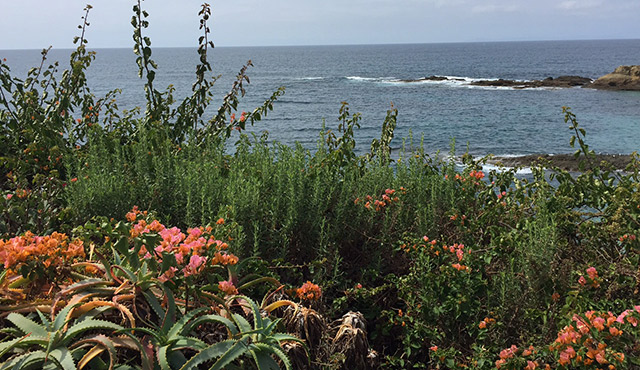The words in the headline above are from the opening of a hymn often sung at Thanksgiving time, and which truly reflect the beauty of God’s creation, especially here on the West Coast. Growing up, I knew the beauty of the West Coast only through National Geographic magazine. Yet, I have experienced it firsthand here in Southern California and other parts of the West. I remember the first time that I flew to Portland on a clear day to visit our seminarians at Mount Angel seminary when I saw so many of the Cascades covered in snow shining in the early morning sun. As I prayed Morning Prayer, this truly was an occasion to praise God.
While much ink has already been spilt over the Holy Father’s encyclical on the environment entitled “Laudato Si,” we already have many opportunities to indeed praise and thank God for the beauty of creation and exercise responsibility for it.
John Allen, who recently spoke at our Conference on Business and Ethics, has reflected more than once on the similarities between Pope Francis and Pope Benedict and even Pope John Paul II. It would be well to examine what can be called the “Papal Magisterium” on creation and the environment to give us background and foundation for the new encyclical, and especially to read it for ourselves and not what it is presumed to say.
For example, on June 10, 2002 there was the “Common Declaration of John Paul II and the Ecumenical Patriarch His Holiness Bartholomew I”. In part, it says that “God has not abandoned the world. It is his will that his design and our hope for it will be realized through our cooperation in restoring its original harmony. In our own time we are witnessing a growth of an ecological awareness which needs to be encouraged, so that it will lead to practical programs and initiatives. An awareness of the relationship between God and humankind brings a fuller sense of the importance of the relationship between human beings and the natural environment, which is God’s creation and which God has entrusted to us to guard with wisdom and love (cf. Gen 1:28).”
And he would later also say that “The earth will not continue to offer its harvest, except with faithful stewardship. We cannot say we love the land and then take steps to destroy it for us by future generations.”
Turning next to Pope Benedict, in his 2007 encyclical entitled “Spe Salvi” (In Hope We are Saved) he teaches that “We can free our life and the world from the poisons and contaminations that could destroy the present and the future. We can uncover the sources of creation and keep them unsullied, and in this way we can make a right use of creation, which comes to us as a gift, according to its intrinsic requirements and ultimate purpose. This makes sense even if outwardly we achieve nothing or seem powerless in the face of overwhelming hostile forces. So on the other hand, our actions engender hope for us and for others; but at the same time, it is the great hope based upon God’s promises that gives us courage and directs our action in good times and bad.”
As the beauty of the sunrise leads to the beauty of the sunsets here, and as the solemnity of the Pacific seen from the pier gives a perspective of time and eternity and makes our daily challenges seem small [and God has the last word!], so too do the teachings of Pope Saint John Paul II and Pope Benedict XVI give us a perspective on the new encyclical of Pope Francis on the environment in giving praise to God and our God-given responsibilities.
At the time of Morning Prayer, when I see the reds and purples of the bougainvillea in the morning sun, or the blue of the Pacific in the evening sun at time of Evening Prayer, so can the teachings of the recent popes give us all framework to be mindful of the glory of God and to give thanks and praise.

